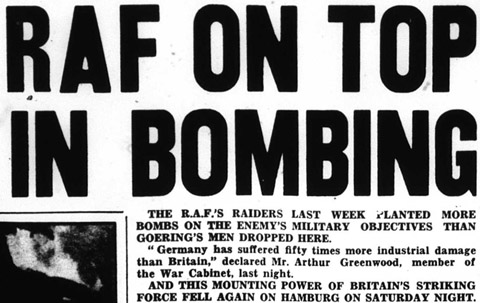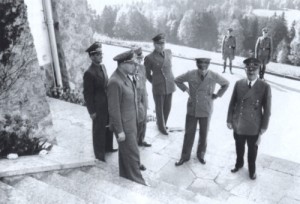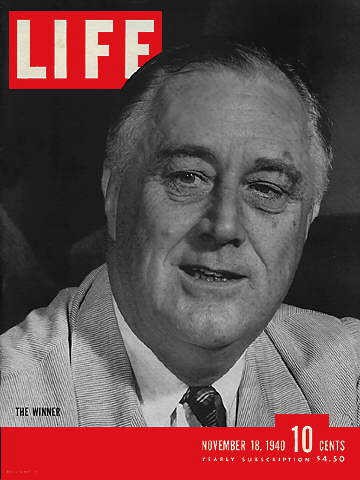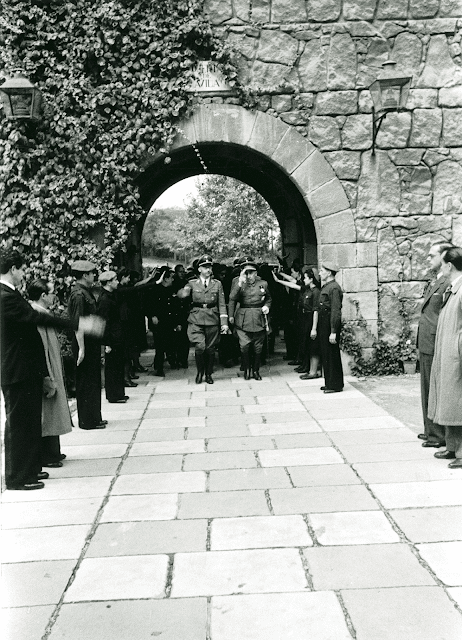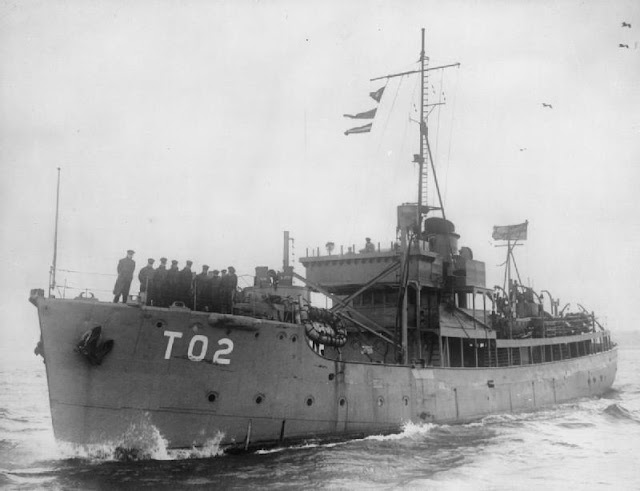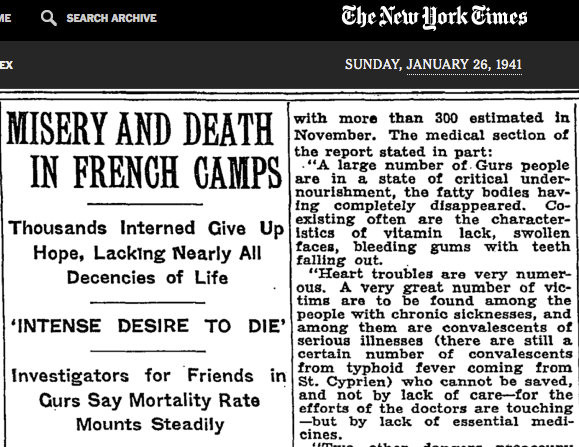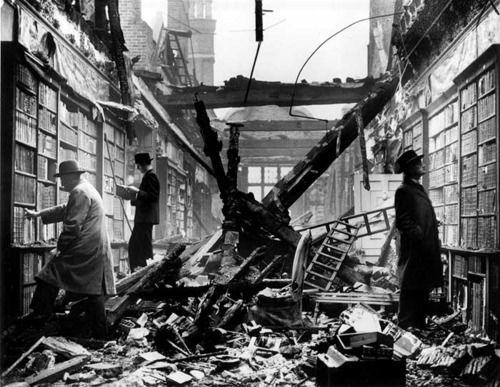Saturday 30 November 1940
 |
| "Liverpool Street Underground Station Shelter: A woman watches her children sleeping in the station tunnel.Baltimore" November 1940. © IWM (D 1577) Photographer: Bill Brandt. |
Greek 3rd Infantry Division attacks around Kazania and Boularat.
The Greeks are on the heights overlooking Argyrokastro. However, the Italians there have decided to fight.
Greek civilian air raid casualties since the beginning of the war on 28 October: 604 killed, 1070 seriously injured.
European Air Operations: The Luftwaffe, which has been targeting individual medium-sized cities for attacks over consecutive nights, switches to Southampton and its suburbs. They send 128 bombers and cause (estimated) 137 deaths and 370 other casualties. The King visits during the day to inspect the damage, which is concentrated in the downtown area. Water pressure drops because 74 water mains are cut, hampering firefighting efforts. The Luftwaffe increasingly has been using incendiary bombs to start fires, then high explosives to spread them. In general, fire-fighting efforts are ineffective in most of the city and the strongest efforts are made to preserve the docks and most important downtown areas.
During the day, the Luftwaffe sends a large fighter-bomber raid over southern England. A few of the raiders make it to London.
RAF Coastal Command makes a dawn raid on U-boat base Lorient. However, RAF Bomber Command cancels its night operations due to poor weather.
British air raid casualties for November:
- 4588 killed
- 6202 wounded
 |
| "Liverpool Street Underground Station Shelter: The floor of a tunnel crammed with sleeping Londoners." November 1940. © IWM (D 1574) Photographer: Bill Brandt. |
U-101 (Kptlt. Ernst Mengersen), on her 5th patrol out of Lorient, torpedoes and sinks 5378-ton British freighter Aracataca in the shipping lanes about 700 km west of Ireland. There are 8 deaths. The Aracataca, incidentally, is a banana boat coming from Jamaica, and its sinking somewhat justifies Lord Woolton's recent decision to stop the importation of bananas in favor of oranges.
Royal Navy 505-ton minesweeper trawler HMT Chestnut hits a mine and sinks off North Foreland, Kent. Everyone survives.
The Luftwaffe damages 187-ton Dutch freighter Gorecht off Southampton.
The weather in the western North Atlantic is terrible, with a hurricane passing near the Canadian coast. Destroyer HMCS St. Croix sustains damage and returns to St. John.
German cruiser Admiral Hipper departs from its anchorage at Kiel in the Elbe River on a raiding mission in the Atlantic.
German freighter Helgoland, which embarked on an extremely risky trip from Columbia to Europe, safely arrives at St. Nazaire.
Convoy OB 252 departs from Liverpool, Convoy FN 347 departs from Southend, Convoys FS 348 and FS 349 depart from Methil, Convoy FS 350 is canceled, Convoy SC 14 departs from Halifax, Convoy BS 9B departs from Aden, Convoy BS A departs from Suez.
During the month of November 1940, the following Allied shipping losses occur (the figures appear differently in different sources, usually due to slight definitional variations):
- U-boat sinkings - 146,613 tons
- Aircraft sinkings - 66,438 tons
- German raiders - 123,671 ton
- Mines - 46,672 tons
Total: 86 Allied ships of 294,054 tons in the Atlantic, 11 Allied ships of 91,661 tons elsewhere.
The Kriegsmarine loses two U-boats (one is presumed lost in November, but may, in fact, be lost in December). The Italians also lose a submarine.
U-boat sinkings of shipping have fallen by over 50% from October - 352,407 tons - but the other causes of sinkings have increased. The Germans have 27 U-boats available for patrols in the Atlantic. Typically, about 1/3 will be on patrol at any one time.
German destroyer DD Z-25 is commissioned.
Soviet submarine K-21 is commissioned.
 |
| "Liverpool Street Underground Station Shelter: Close-up of sleeping people, their heads resting against the arched walls of the underground tunnel." November 1940. © IWM (D 1575). Photographer: Bill Brandt. |
Battle of the Indian Ocean: German raider Pinguin, with captured freighter Storstad following, has headed to the southwest in the mid-Indian Ocean, taking it away from a searching Australian cruiser. The crew has painted the ship black. The crew spots a freighter and closes, opening fire and destroying the radio. After the first salvo, the freighter is a flaming wreck, its captain dying. It is 8301-ton British refrigerated ship Port Wellington - a sister ship of the Pinguin's last victim, Port Brisbane. The Pinguin takes the 82-man crew and seven women passengers as prisoners (the captain and one other perish from injuries). Pinguin then sinks the ship - but not before the Pinguin's first officer personally returns to the burning ship to retrieve clothing for the women (many in only their nightgowns). The Pinguin now has 405 prisoners on board.
Japanese/Chinese Relations: The Japanese recognize and conclude a treaty with their Chinese puppet government led by Ching-wei.
Being desirous that these two countries should respect their inherent characteristics and closely cooperate with each other as good neighbors under their common ideal of establishing a new order in East Asia on an ethical basis, establishing thereby a permanent peace in East Asia …Ching-wei's government is based in Nanking. Setting up puppet governments in occupied territory is a typical tactic used throughout World War II by several governments. Essentially, it is just a propaganda move. The Nationalist Chinese government in Chungking led by Chiang Kai-shek has rejected secret peace feelers from the Japanese, and this is the result.
US/China Relations: The US extends $100 million in aid ($50 million for currency stabilization, $50 million in purchase credits) to China.
 |
| "Liverpool Street Underground Station Shelter: A family sleeps in the underground tunnel; even the girl's doll has its own improvised bed." November 1940. © IWM (D 1582). Photographer: Bill Brandt. |
Lorraine's return to the Reich has closed an historical chapter which liberated age-old German land and righted a political wrong. The century-long battle for the Rhine has now been ended. Within this territory the complete economical and political union of Lorraine and Saarpfalz will be effected.US/Latin American Relations: In a telegram to Secretary of State Cordell Hull, US Ambassador to Uruguay Edwin C. Wilson once again warns of virulent pro-German sentiment in the country. Such worries about Uruguay and Argentina are what have led to the succession of "Show the Flag" operations that are still on-going. Wilson paints a picture of a weak government unable to stop the growth in pro-German sentiment which he claims could lead to an "armed movement."
 |
| Lucille Ball wedding photo. |
The presence of the fleet in the Pacific at this time is a very practical contribution to the maintenance of peace in the Pacific.Bullitt, meanwhile, is a controversial figure who is marked for replacement by Admiral Leahy.
British Military: Prime Minister Winston Churchill appoints legendary Air Marshal Hugh Trenchard to a new position reorganizing the military's intelligence services. Trenchard is a believer in the RAF fighters taking the fight to France and not remaining in a purely defensive posture - "lean toward France."
Romania: The turmoil in Romania continues, largely stirred up by the Iron Guard but also flowing from the country's recent territorial losses. The police are making mass arrests. It is the second anniversary of the announcement of the murder of Iron Guard Founder Corneliu Zelea Codreanu. The body of Codreanu, which the government dissolved in acid and placed under seven tons of concrete in the prison, is reburied. The Luftwaffe, reflecting a deep German interest in Romania, flies over the ceremony and drops wreaths over the open casket.
Codreanu, incidentally, remains a very popular figure in Romanian society in the 21st Century, fairly recently (2006) coming in 22nd in a Romanian Television poll of "100 Greatest Romanians" of all time. It is illegal in Romania, however, to talk about the fascist Iron Guard in a positive way, and where exactly that line is drawn with regard to Codreanu has become a very controversial issue in Romanian society.
China: The Japanese 11th Army, facing heavy Chinese counterattacks, retreats to its start line in the Central Hubei sector (Han River Operation). The Chinese 5th War Area re-occupies all territory lost during the failed Japanese offensive.
US Homefront: Navy wins the annual Army-Navy Game in Philadelphia, 14-0. It is the 50th game in the series.
Lucille Ball and Desi Arnaz have eloped to Connecticut. They get married with a wedding ring purchased at the last minute from Woolworth's:
Eloping with Desi was the most daring thing I ever did in my life. I never fell in love with anyone quite so fast. He was very handsome and romantic. But he also frightened me, he was so wild. I knew I shouldn't marry him, but that was one of the biggest attractions."Lucy and Desi: The Legendary Love Story of Television's Most Famous Couple," Warren G. Harris (Simon & Schuster 1991).
 |
| Having eloped yesterday, Lucille Ball and Desi Arnaz get married today. The two met earlier in 1940 while filming the Rodgers and Hart stage hit Too Many Girls. |
November 1940
November 1, 1940: Hitler Irate
November 2, 1940: U-31 Sunk - Again
November 3, 1940: Kretschmer's Master Class
November 4, 1940: Spain Absorbs Tangier
November 5, 1940: Jervis Bay Meets Admiral Scheer
November 6, 1940: San Demetrio Incident
November 7, 1940: Galloping Gertie
November 8, 1940: Italian Shakeup in Greece
November 9, 1940: Dutch Fascists March
November 10, 1940: Fala and Doc Strange
November 11, 1940: Taranto Raid
November 12, 1940: Molotov Takes Berlin
November 13, 1940: Molotov Foils Hitler
November 14, 1940: Moonlight Sonata
November 15, 1940: Warsaw Ghetto Sealed
November 16, 1940: France Keeps Battleships
November 17, 1940: Malta Hurricane Disaster
November 18, 1940: Hitler Berates Ciano
November 19, 1940: Birmingham Devastated
November 20, 1940: Hungary Joins Axis
November 21, 1940: Dies White Paper
November 22, 1940: Italians Take Korçë
November 23, 1940: U-Boat Bonanza!
November 24, 1940: Slovakia Joins In
November 25, 1940: Molotov's Demands
November 26, 1940: Bananas Be Gone
November 27, 1940: Cape Spartivento Battle
November 28, 1940: Wick Perishes
November 29, 1940: Trouble in Indochina
November 30, 1940: Lucy and Desi Marry
December 1940
December 1, 1940: Wiking Division Forms
December 2, 1940: Convoy HX 90 Destruction
December 3, 1940: Greeks Advancing
December 4, 1940: Italian Command Shakeup
December 5, 1940: Thor Strikes Hard
December 6, 1940: Hitler's Cousin Gassed
December 7, 1940: Storms At Sea
December 8, 1940: Freighter Idarwald Seized
December 9, 1940: Operation Compass Begins
December 10, 1940: Operation Attila Planned
December 11, 1940: Rhein Wrecked
December 12, 1940: Operation Fritz
December 13, 1940: Operation Marita Planned
December 14, 1940: Plutonium Discovered
December 15, 1940: Napoleon II Returns
December 16, 1940: Operation Abigail Rachel
December 17, 1940: Garden Hoses and War
December 18, 1940: Barbarossa Directive
December 19, 1940: Risto Ryti Takes Over
December 20, 1940: Liverpool Blitz, Captain America
December 21, 1940: Moral Aggression
December 22, 1940: Manchester Blitz
December 23, 1940: Hitler at Cap Gris Nez
December 24, 1940: Hitler at Abbeville
December 25, 1940: Hipper's Great Escape
December 26, 1940: Scheer's Happy Rendezvous
December 27, 1940: Komet Shells Nauru
December 28, 1940: Sorge Spills
December 29, 1940: Arsenal of Democracy
December 30, 1940: London Devastated
December 31 1940: Roosevelt's Decent Proposal
2020

